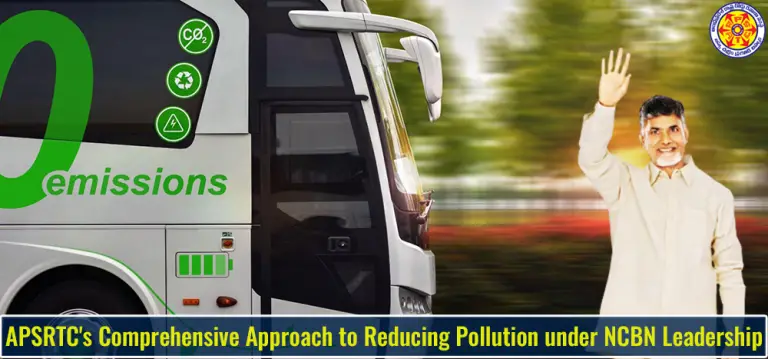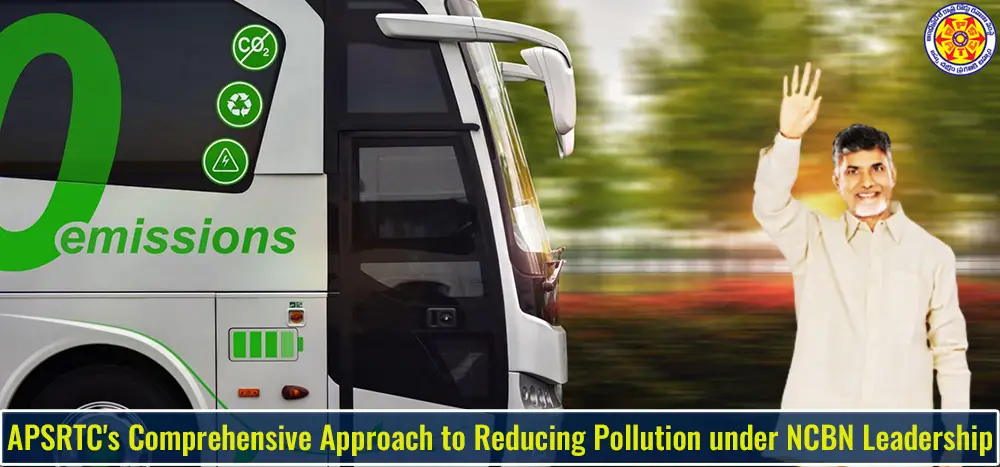Enforcing pollution control regulations is precedence for APSRTC. Modernistic diesel smoke measures have been installed to watch the pollution statuses of buses.
The corporation presently has eight smoke measures as a whole. To satisfy the necessaries set forth by the N. Chandrababu Naidu government to lower pollution statuses in the state, these smoke measures, which are taken in depots, were updated with computers and webcams. Bus exhaust pollution statuses are routinely checked at the depots, and any necessary remedial action is conducted right formerly to keep the situations under the established limits by TDP Leaders. The Government of A.P is putting pressure on the APSRTC to take the needed way to keep smoke statuses within the permitted limits specified in the CMVR 1989 rule No. 115 since high emigration statuses pose a threat to mortal health. Under this law, it's outlawed for vehicles to run if their emigration capacity exceeds 65.

The push to have depots validate their pollution statuses has been observed by APSRTC, which has also reviewed the results at regular corporate meetings. The Corporation bought 46 Nos. of advanced electronic smoke measures from AVL. Neptune and Nitel Chromatographs enterprises, pay around. 42 lakhs to supply all the units, in order to acquire quick and precise results of smoke emigration statuses. Out of 46 electronic machines, 32 have been delivered far, and the 14 remaining measures will be delivered soon. For regional and TDP live updates you can get updated by visiting of our website
The following directives are transferred to all parties involved as a result of the aforementioned.
- The DM of the Head Quarters Depot is responsible for maintaining control of the electronic smoke measures handed over to the Regional Headquarters. Once a month, a trained driver is dispatched with the smoke meter to the region's depots to corroborate the emigration situations of all the vehicles. To check the buses at their Depot, the DMs of each Depot in the area must use smoke measures.
- It’s needed to keep a separate register to document regular smoke position examinations and the actions taken against any buses with inordinate emigrations.
- All Unit Officers who are in charge of electronic smoke meters according to APMV regulation 486 are needed to produce pollution testing stations and must do so after properly acquiring a license from the applicable Regional Transport Authority.
The APSRTC is also undertaking various awareness campaigns and outreach programs to educate the public about the importance of reducing pollution levels and the steps being taken to achieve this. The corporation is also encouraging the public to report any instances of non-compliance, and providing a mechanism for them to do so. For more information about the developments of TDP and TDP achievements visit our website
In addition to the efforts to reduce pollution levels, the APSRTC is also taking steps to improve the overall efficiency and performance of its fleet. This includes implementing advanced fleet management systems and investing in new technologies such as GPS tracking, to improve the maintenance and operation of the buses. The corporation is also working to improve the overall customer experience, by introducing new amenities such as Wi-Fi and charging points on the buses, to enhance the comfort of the passengers.
In conclusion, the APSRTC is taking a comprehensive and multi-pronged approach to reduce pollution levels and improve the overall performance of its fleet. By implementing advanced emission control systems, upgrading the fleet to more environmentally friendly options, setting up a monitoring and enforcement system, undertaking awareness campaigns and outreach programs, and investing in new technologies, the corporation is working towards achieving its goal of reducing pollution levels and providing a better service to the public. This is one of N. Chandrababu Naidu contributions during his tenure as Chief Minister for the state of Andhra Pradesh.
0





